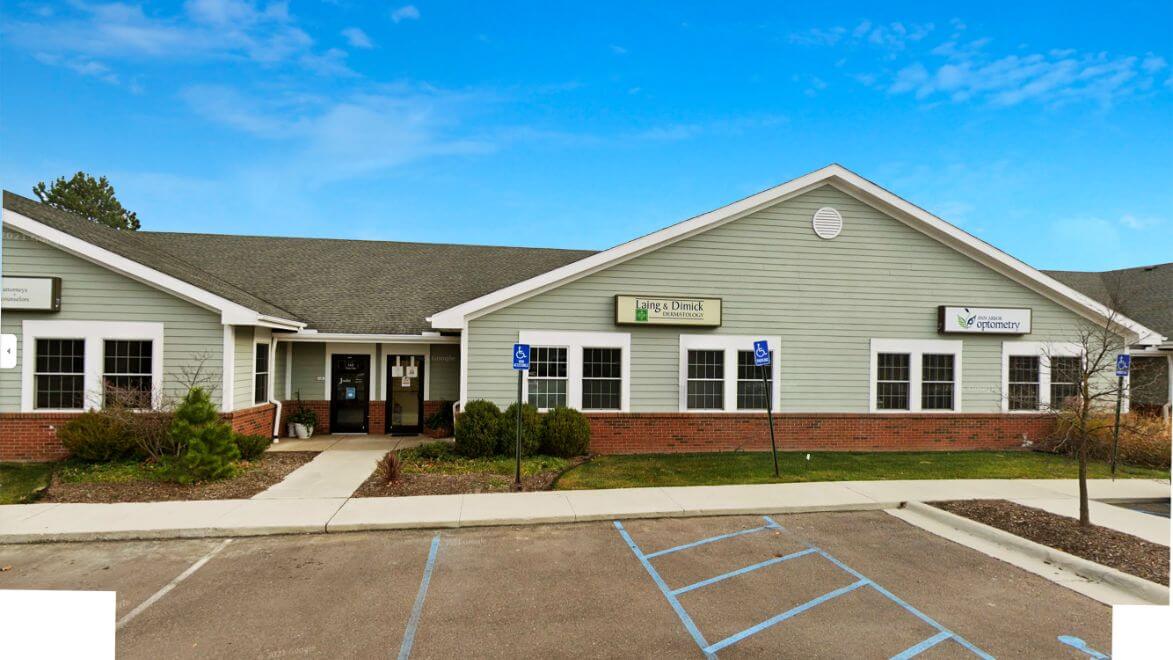How Nail Salons Can Cause Nail Fungus
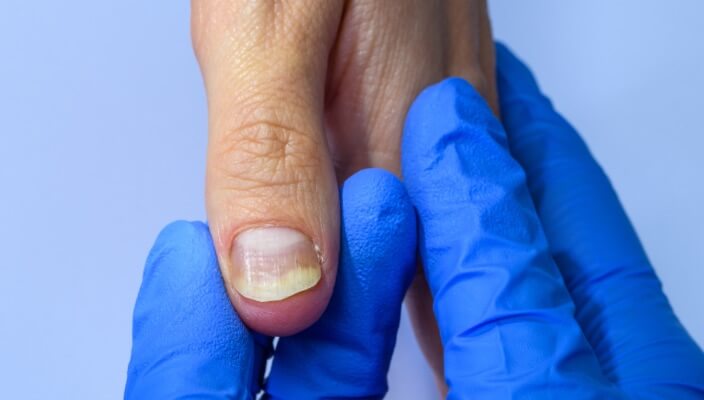 Have you ever left a nail salon with more than just a fresh set of nails? At Pinnacle Dermatology, we understand that nail fungus is a concern for many patients who frequent salons. This article will delve into how nail salons can be a breeding ground for fungal infections and provide practical tips to help you prevent nail fungus during your visits. We'll also discuss effective treatments to restore the health of your nails and how to maintain them post-salon. By reading on, you'll learn how to safeguard your skin's health while still enjoying your salon pampering sessions.
Have you ever left a nail salon with more than just a fresh set of nails? At Pinnacle Dermatology, we understand that nail fungus is a concern for many patients who frequent salons. This article will delve into how nail salons can be a breeding ground for fungal infections and provide practical tips to help you prevent nail fungus during your visits. We'll also discuss effective treatments to restore the health of your nails and how to maintain them post-salon. By reading on, you'll learn how to safeguard your skin's health while still enjoying your salon pampering sessions.
How Nail Salons Can Be a Source of Nail Fungus
At Pinnacle Dermatology, we understand that a visit to the nail salon is often a treat for your hands and feet. However, it's crucial to be aware of the risks associated with improperly sanitized tools, which can lead to skin care concerns like nail fungus. Shared equipment in salons can be a conduit for infection transmission if not handled correctly. We'll also discuss the telltale signs of unsafe salon practices, so you can make informed decisions about where to receive your treatments. Ensuring your safety is as important as the aesthetic outcome of your salon visit. If you would like to schedule an appointment, feel free to contact us.
Risks of Improperly Sanitized Tools
At Pinnacle Dermatology, we've seen firsthand how the excitement of a fresh manicure can be overshadowed by the risk of contracting a fungal infection. When nail salon tools are not properly sterilized, the likelihood of spreading fungus and other diseases increases significantly. An injury as minor as a cuticle nick can open the door to infection, turning a simple beauty treatment into a source of discomfort and concern.
We advise our clients to be vigilant about the sanitation practices of their chosen salons to prevent fungal infections. It's not just about the cleanliness of the space; it's the meticulous sterilization of clippers, files, and other equipment that matters. We've encountered cases where a lack of proper tool disinfection has led to stubborn and sometimes painful fungal conditions, emphasizing the importance of safe salon habits.
Shared Equipment and Infection Transmission
At Pinnacle Dermatology, we're acutely aware that shared equipment at nail salons can be a breeding ground for dermatophytosis and onychomycosis, common types of nail fungus. If tools like nail files and clippers are used on multiple clients without proper sterilization, they can transmit these conditions, which often require antifungal treatments or topical medication to resolve. We emphasize the importance of observing salon hygiene to mitigate the risk of such infections.
Our experience has shown that the warm, moist environment of a foot spa can also contribute to the spread of psoriasis and fungal infections. We encourage clients to ask their nail technicians about the disinfection process and to look for single-use tools or equipment that has been thoroughly sanitized. This vigilance can prevent the need for lengthy and sometimes complex antifungal therapies, ensuring your salon experience remains a positive one.
Signs of Unsafe Salon Practices
At Pinnacle Dermatology, we've observed that one of the most glaring signs of unsafe salon practices is the absence of proper hygiene protocols. For instance, if you notice that the equipment is not being sterilized between clients, this should raise a red flag. The risk of fungal infections, and other toe-related ailments increases when hygiene is compromised. We recommend seeking salons that use laser therapy for sterilization, as this is one of the most effective methods for ensuring the cleanliness of salon tools.
Another indicator of potentially hazardous salon conditions is the use of outdated or visibly worn equipment. As professionals, we understand that tools like emery boards, which cannot be sterilized, should be single-use to prevent cross-contamination. If your nail technician is reusing such items, it's a sign that the salon may not be prioritizing your health. We advise our clients to be proactive in asking about the salon's disinfection practices to safeguard against infections that could lead to more serious complications.
Examples of Nail Fungus
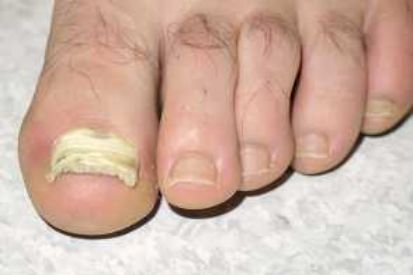
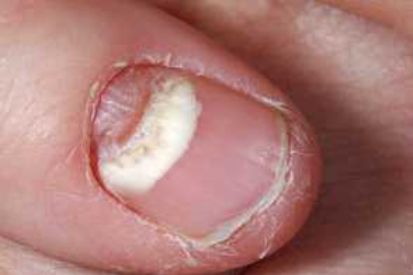
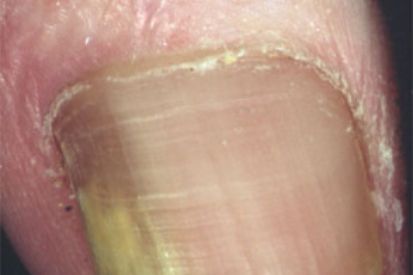
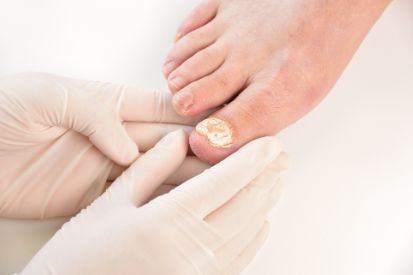
Tips for to Prevent Nail Fungus at Salons
At Pinnacle Dermatology, we're committed to empowering our clients with knowledge to prevent nail fungus during salon visits. We'll guide you through essential questions to ask your nail technician, key observations to make during your appointment, personal protective steps to consider, and the advantages of bringing your own nail tools. These strategies not only protect your immune system but also prevent dermatitis and the spread of dermatophyte infections. Understanding these measures, including the judicious use of nail polish and treatments like terbinafine, can significantly reduce the risk of fungal infections.
Questions to Ask Your Nail Technician
At Pinnacle Dermatology, we often remind our clients that asking the right questions can be as crucial as the treatment itself. Before your nail technician begins, inquire about their sterilization process: "How do you sterilize your tools, and how often?" This question is vital, as proper sterilization can prevent the spread of nail fungus, which may require treatments like itraconazole, as noted by the Mayo Clinic. Additionally, ask if they have a physician on call or a protocol in place for handling injuries or pain that might occur during the service.
Understanding the products used during your nail service can also help mitigate health risks, including those related to cancer. We suggest asking, "What brands of nail polish and treatment products do you use, and do they contain any harmful chemicals?" To help you remember these important questions, we've compiled a list:
- How do you sterilize your tools, and how often?
- Do you have a physician on call or a protocol for handling injuries?
- What brands of nail polish and treatment products do you use, and do they contain any harmful chemicals?
What to Look for During a Salon Visit
During your salon visit, we at Pinnacle Dermatology recommend a keen observation of the salon's cleanliness, akin to the standards you'd expect at a swimming pool. Notice if the footbaths are thoroughly disinfected between clients to prevent the spread of yeast and other skin conditions. The presence of clear protocols for cleaning and the visible use of disinfectants are good indicators that the salon is minimizing your risk of infection.
Additionally, it's essential to observe the handling of tools and equipment. Ensure that each set is either new or has been autoclaved, a process similar to what we use in medical settings to eliminate bacteria and fungi. This attention to detail is crucial, as contaminated tools can not only cause nail fungus but also exacerbate conditions like acne. A salon that prioritizes hygiene demonstrates a commitment to safeguarding your skin's health.
Personal Protective Measures You Can Take
At Pinnacle Dermatology, we recommend taking personal protective measures to reduce the risk of contracting nail fungus during a pedicure. One effective strategy is to apply a topical antifungal cream as a preventive measure before your salon visit, especially if you have a history of infections like those caused by Trichophyton rubrum. This preemptive step can provide a protective barrier against the pathogens that cause itch and discomfort associated with fungal infections.
Furthermore, we advise our clients to consider using oral antifungal medications such as fluconazole as a prophylactic measure, particularly for those who frequent nail salons. This medication, when prescribed and monitored by a healthcare professional, can help prevent the onset of fungal infections. It's essential to consult with a dermatologist to determine if this approach is suitable for you, ensuring that your salon experiences remain both enjoyable and safe for your nail health.
The Benefits of Bringing Personal Nail Tools
At Pinnacle Dermatology, we often suggest that clients bring their own nail tools to the salon. This practice significantly reduces the risk of contracting infections such as nail fungus, which thrives in communal environments. Personal tools eliminate the uncertainty surrounding the salon's sterilization process, offering peace of mind and a safer experience. Especially for individuals with conditions like rosacea, which can be exacerbated by infection, using personal items can help maintain skin health.
Moreover, incorporating personal care items like tea tree oil, known for its antifungal properties, into your routine before and after salon visits can be beneficial. We recommend applying a small amount of tea tree oil to your nails after showering to create an additional barrier against fungal infections. This proactive approach, coupled with the use of personal tools, ensures that your salon experience is focused on beauty without compromising your health, whether you're styling your hair or walking barefoot on the beach.
Effective Treatments for Nail Fungus
At Pinnacle Dermatology, we're committed to providing effective treatments for nail fungus, often caused by candida, which can thrive in the warm, moist environments of nail salons. For mild to moderate infections, we recommend topical antifungals like ciclopirox, which can be applied directly to the affected nails to inhibit fungal growth.
We understand that individuals with diabetes are at a higher risk for complications like cellulitis from fungal infections. In such cases, we may prescribe oral antifungal medications that offer a more systemic approach to eradicating the infection and preventing its spread.
For our clients seeking advanced treatment options, we offer efinaconazole, a topical solution designed to treat nail fungus with a convenient once-daily application. This medication has shown promising results in penetrating the nail bed and providing relief from the infection.
Our approach at Pinnacle Dermatology is to tailor treatment plans to each individual's needs, considering factors like the severity of the infection and any underlying health conditions. We strive to restore the health and appearance of your nails with the most effective and appropriate medical interventions available.
Maintaining Healthy Nails After Salon Visits
After a visit to the nail salon, maintaining the health of your nails is paramount. We at Pinnacle Dermatology recommend establishing a nail hygiene routine, vigilant monitoring for signs of infection, and understanding when to consult with a dermatology professional. These steps are crucial, especially for those with artificial nails, to prevent conditions like candidiasis and infections caused by trichophyton. Additionally, we'll explore long-term strategies to prevent the recurrence of nail fungus, ensuring your nails remain healthy and aesthetically pleasing.
Establishing a Nail Hygiene Routine
At Pinnacle Dermatology, we emphasize the importance of a nail hygiene routine as a preventive measure against nail fungus, a chronic condition that can be exacerbated by salon visits. We advise our clients to regularly inspect their nails for any signs of infection, such as discoloration or thickening, which could indicate the presence of mold or other pathogens. It's essential to keep nails clean and dry, as moisture can create an ideal environment for fungal growth.
Furthermore, we recommend incorporating over-the-counter antifungal treatments into your nail care regimen, especially if you have a history of nail fungus. While these products are not as potent as prescription medicine, they can be effective in managing early signs of infection. For those seeking cosmetic treatments like botox, it's crucial to maintain nail health to prevent any potential complications that could arise from a compromised immune system due to a fungal infection.
Monitoring Nails for Signs of Infection
At Pinnacle Dermatology, we stress the importance of monitoring your nails for signs of infection, particularly after a manicure. If you notice changes such as discoloration, thickening, or the development of tinea cruris (also known as jock itch), which can spread to the nails, it's imperative to seek a professional evaluation. A timely diagnosis, often confirmed with a blood test, can prevent the progression of nail disease and ensure appropriate treatment.
We've observed that early detection of nail fungus is crucial for effective management. Should you experience any abnormalities in nail texture or color, it's advisable to consult with a dermatologist. We're equipped to perform a surgical nail biopsy if necessary, which can provide a definitive diagnosis and guide the course of treatment. This proactive approach helps maintain the health of your nails and mitigates the risk of further complications.
When to Consult With a Dermatology Professional
At Pinnacle Dermatology, we advise clients to consult with a dermatology professional if they notice persistent changes in their nails that could indicate a fungal infection. Symptoms such as nail discoloration, thickening, or the appearance of scars beneath the nail surface are signs that it's time to seek expert advice. These symptoms may not only be unsightly but can also be indicative of underlying health issues, such as liver disease, which can manifest in the nails.
Furthermore, if you experience persistent pain in your fingers or toes, or if there's evidence of bacteria causing nail changes, it's crucial to cure these conditions promptly. A dermatologist can provide a comprehensive evaluation and recommend treatments that may include both topical and oral medications. We understand the importance of addressing these concerns early to prevent long-term damage to the nail bed and surrounding tissues:
- Noticeable nail discoloration or thickening.
- Scarring or changes beneath the nail surface.
- Persistent pain in fingers or toes.
- Signs of bacterial infection around the nail area.
It's essential to remember that nail health is a reflection of overall well-being, and consulting with a dermatology professional at the first sign of trouble can help ensure a swift and effective cure. At Pinnacle Dermatology, we're committed to providing our clients with the care they need to maintain healthy, beautiful nails free from the risks associated with nail salons.
Long-Term Strategies to Prevent Nail Fungus Recurrence
At Pinnacle Dermatology, we emphasize that preventing the recurrence of nail fungus involves more than just treating the current infection; it requires a holistic approach to nail care. One effective long-term strategy is to address any underlying risk factors, such as compromised circulation or a weakened immune system, which can predispose individuals to skin infections. Regular debridement by a healthcare professional can also help maintain nail health and prevent the buildup of fungi-friendly environments.
We also advise our clients to be mindful of their footwear choices, as tight shoes can create a moist habitat conducive to fungal growth. Opting for breathable materials and changing socks frequently can significantly reduce the risk of reinfection. Additionally, for those prone to skin conditions like pseudofolliculitis barbae, maintaining a clean and dry environment around the nails is crucial to prevent the aggravation of any existing skin infection.
Schedule an Appointment with Pinnacle Dermatology
If you're concerned about nail fungus after a visit to a nail salon, we at Pinnacle Dermatology are here to help. Our experts can prescribe treatments such as tavaborole, an antifungal medication that targets the site of infection. We ensure that your nail health is restored with the most effective care.
For those suffering from atopic dermatitis, maintaining nail health is particularly crucial, as compromised skin can be more susceptible to fungal infections. We provide comprehensive care plans that address both your dermatological and nail care needs, ensuring a holistic approach to your skin's health.
At Pinnacle Dermatology, we understand that natural remedies like oil treatments can complement medical therapies for nail fungus. We can guide you on how to safely incorporate these into your care regimen, potentially enhancing the efficacy of prescribed treatments and supporting the health of your nails.
Our team is also experienced in managing conditions like lichen planus, which can affect the nails and be mistaken for fungal infections. We offer accurate diagnoses and tailored treatment options to manage your symptoms effectively:
- Prescription of antifungal medications like tavaborole.
- Personalized care plans for atopic dermatitis and nail health.
- Guidance on the use of oil treatments alongside medical therapies.
- Expert management of nail-affecting conditions such as lichen planus
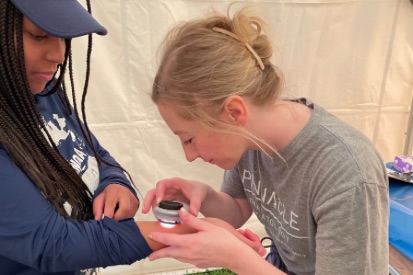
Schedule Your Visit at Pinnacle Dermatology
At Pinnacle Dermatology, we understand the importance of addressing nail fungus early to avoid complications. Contact us to arrange a consultation and take the first step towards healthy nails and skin.
Featured Products
Check your local office for current stock!
Check your local office for current stock!
Featured Blogs
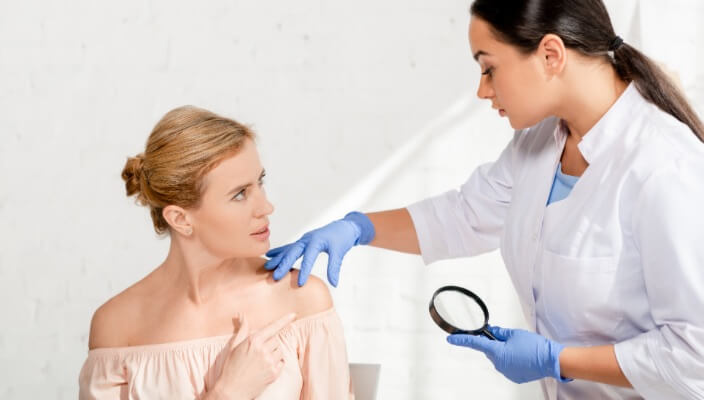
- General Dermatology
Curious if it's time to consult a dermatologist? Explore key signs and considerations to determine whether a visit to a skincare expert is essential for your skin health and well-being.
Read More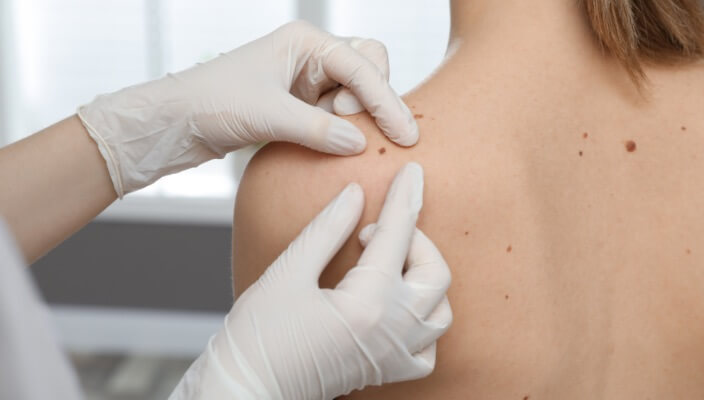
- Skin Cancer
- General Dermatology
- Skin Exams
Your skin is your largest organ and its first line of defense. Learn more about why a skin exam should be a part of your wellness routine.
Read More
- General Dermatology
Learn to identify nail fungus. Discover symptoms, differences, and prevention tips to keep your nails healthy.
Read More


